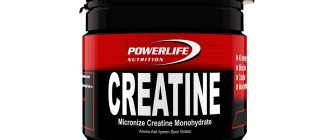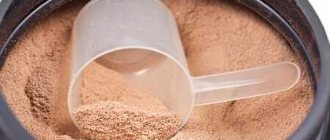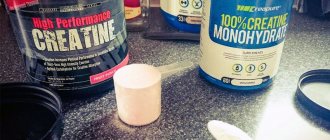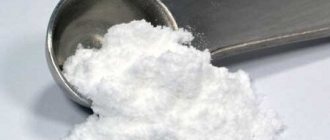Nutrition and dietSports nutrition
Everything you want to know about creatine monohydrate: what it is, how to take it, is it right for you personally, what are the benefits of taking creatine monohydrate and much more.
Creatine monohydrate is one of the most popular supplements in the world for people seeking to gain muscle mass, increase physical performance and increase strength. According to research, more than 40% of National College Athletic Association (NCAA) athletes say they take creatine.
Of all the existing sports supplements, creatine has received the most scientific research. Despite this, you still hear a lot of misinformation about this nutrient both on the Internet and in gyms. This short guide contains proven facts about creatine monohydrate and answers to all your questions.
If after reading the article you have any questions regarding creatine monohydrate, please voice them in the comments.
Composition and properties of creatine
This natural protein consists of several components. In tandem, they create a product that helps you quickly build muscle mass and increase your physical abilities.
So, creatine contains arginine, glycine and methionine. Individually, they have very useful properties. But together these three substances do incredible things. In particular, if you want to gain muscle mass. Not all preparations based on it have this composition and properties of creatine. Some manufacturers produce creatine with the addition of many vitamins and microelements.
Creatine in medicine
Author: Emil Gizatullin
Editor: Veronica Rees, Artem Volkov, Daniil Sharafutdinov
Creatine is an essential natural substance (methyl guanidoacetic acid) that is found in human muscle and nerve tissue and is required for energy metabolism, muscle movement and human existence. Creatine deficiency is associated with a number of physical and mental disorders. You can read about this in scientific studies here and here.
The human body synthesizes creatine from 3 amino acids: glycine, arginine and methionine. This process takes place in the kidneys and liver. 1-2 g of creatine is synthesized per day. Typically, the body excretes it by converting it to creatinine, which is then excreted in urine (Buford et al, 2007). Thus, constant replenishment of creatine in the body through diet or endogenous sources is required. You can get 1g of creatine from food, such as meat and fish (Cooper et al, 2012).
Where is it used?
Five good-quality studies in older adults (over 60 years of age) with sarcopenia reported effects of creatine supplementation on muscle mass and muscle strength, and four of these also reported effects on physical performance.
Supplementation protocols were heterogeneous: three studies used 5g/day creatine, while two other studies used a higher dose of creatine for the first week, then 5g/day thereafter, and one study used 0.1g/kg/day. day. Summary:
- muscle mass increased with exercise in 5/5 RCTs (randomized controlled trials), and an additional effect of creatine was found in 4/5 RCTs;
- muscle strength increased with exercise in 5/5 RCTs, and 4/5 RCTs found an additive effect of creatine on some muscle strength outcomes;
- physical performance was increased by exercise in 3 of 4 RCTs, and 1 of 4 RCTs found an interactive effect of creatine.
Perhaps the main reason for this beneficial effect is the ability of creatine supplementation to markedly increase the content of total creatine and creatine phosphate within cells (Harris et al,1992).
The transfer of a phosphate group from creatine phosphate to adenosine diphosphate (ADP) with the enzyme catalyzing the reaction, creatine kinase, allows the rapid formation of adenosine triphosphate (ATP), the main source of energy for muscle contraction and myofibril synthesis.
The creatine transporter is found predominantly in neurons. In general, the creatine transporter was found and characterized at high intensity in the major motor and sensory areas of the forebrain, brainstem and spinal cord, and in forebrain areas associated with learning, memory, and the limbic system.
It is hypothesized that regions with high levels of the creatine transporter have high ATP metabolism, while regions with low levels are more vulnerable to neurodegenerative diseases.
Fifty-two women with major depressive disorder participated in an 8-week randomized, double-blind, placebo-controlled study of creatine monohydrate plus selective serotonin reuptake inhibitors (SSRIs). After 2 weeks, scores on the Hamilton Depression Scale improved significantly compared to the placebo group, in which subjects took only SSRIs.
In addition, creatine has been shown to have neuroprotective effects in the treatment of neurological disorders such as Parkinson's disease and amyotrophic lateral sclerosis.
Creatine supplementation improves glycemic control in patients with type 2 diabetes. The underlying mechanism appears to involve increased recruitment of GLUT-4 to the sarcolemma.
Creatine supplementation does not affect kidney function in patients with type 2 diabetes, opening the door to explore its promising therapeutic role in this group of people.
And finally, cardiovascular diseases (CVD). CVDs are the leading cause of death worldwide, with more people dying from CVDs each year than from any other disease. An estimated 17.3 million people died from CVDs in 2008, accounting for 30% of all global deaths. Of these cases, an estimated 7.3 million were due to coronary heart disease and 6.2 million due to stroke.
Phosphocreatine (PCr) plays an important role in the energy metabolism of the heart, and a decrease in its intracellular concentration leads to changes in the energy and function of the myocardium. A meta-analysis of all randomized and matched trials that compared PCr with placebo or standard care (in patients with coronary artery disease or chronic heart failure or in patients undergoing cardiac surgery) included 22 trials. Patients receiving creatine had lower all-cause mortality compared with controls. Administration of creatine, in comparison with the control group, showed:
- higher left ventricular ejection fractions;
- lower peak myocardial creatinine kinase release;
- lower frequency of major arrhythmias;
- lower frequency of inotropic support;
- higher level of spontaneous recovery of heart function after cardiopulmonary bypass.
In a mixed group of patients with coronary artery disease, chronic heart failure, or patients undergoing cardiac surgery, creatine may reduce short-term all-cause mortality. Additionally, creatine supplementation was associated with improved cardiac outcomes.
From thoughts. Creatine can slow down the process of atherosclerosis, being one of the protein synthesis factors identified by Professor V.N. Seluyanov. All vessels are mainly composed of protein; atherosclerosis can begin only with microdamage to arterial vessels.
Side effects
This RCT compared side effects and described the effects on indirect markers of renal function with long-term creatine supplementation. 175 subjects (age = 57.7 ± 11.1 years) were randomly assigned to receive creatine monohydrate 10 g per day or placebo for a mean period of 310 days. At one month, two months, and every fourth month thereafter, side effects were assessed using dichotomous questionnaires, plasma urea concentrations were measured, and urinary creatine and albumin concentrations were determined.
There were no significant differences in the incidence of side effects from taking creatine at any time (23% nausea in the creatine group vs. 24% in the placebo group; 19% gastrointestinal discomfort in the creatine group vs. 18% in the placebo group; 35% diarrhea in the placebo group). creatine versus 24% in the placebo group).
After two months of treatment, subjects using creatine were more likely to experience swollen extremities, likely due to water retention. Severe diarrhea (n = 2) and severe nausea (n = 1) caused 3 patients in the creatine group to stop taking creatine, after which these side effects disappeared. Long-term creatine supplementation did not result in increased plasma urea levels (5.69 ± 1.47 pre-treatment versus 5.26 ± 1.44 at end of treatment) or a higher prevalence of microalbuminuria (up to 5.4% pre-treatment versus 1 .8% at the end of treatment).
What types of creatine are there?
Due to inexperience, many novice athletes make the mistake of purchasing creatine without studying its composition. Today, most manufacturers do not limit themselves to producing one type of this additive.
So, creatine can be found under the names:
- creatine anhydrous;
- creatine citrate;
- creatine malate;
- creatine phosphate;
- creatine monohydrate.
The most effective of the above is considered to be the last one on the list.
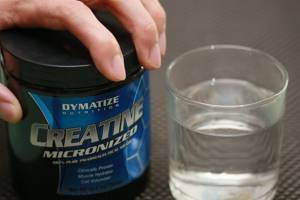
This is due to the fact that this form is better absorbed by the body than all others. Also, many fitness trainers recommend taking creatine in combination with special supplements that enhance its effect. We will tell you further how to drink creatine monohydrate.
Types of Creatine
The modern sports nutrition industry is developed quite well and the range of types of sports nutrition is growing, and the number of types within each type is growing. Most often, the reason for the emergence of new types of products is marketing and the search for uniqueness. However, often the most effective remains the classic form, which is creatine monohydrate.

How to take creatine correctly
Taking creatine, like other medications, requires studying the instructions for it. A preliminary consultation with a specialist is also necessary. An equally important point is a thorough study of the composition and properties of creatine in order to prevent possible allergic reactions to its components.
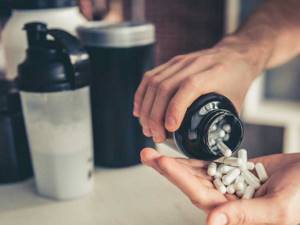
The standard dose of creatine preparations for an ordinary person and for a beginning athlete is 1-2 grams. For those who constantly exercise their body every day, the dose of creatine should be at least 4 grams.
Will creatine harm your health?
This is the first question that arises among people who want to “build” a beautiful body. Everyone is afraid, everyone is worried and is looking for an answer to this question. However, you need to independently research the pros and cons of taking the drug, the properties and composition of creatine.
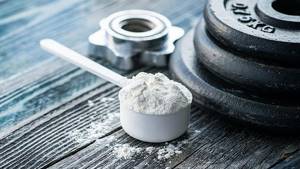
Today there is no single scientific study on the dangers of creatine for human health. There is an opinion that it has a negative effect on the kidneys or liver function. However, the professors proved the opposite. Therefore, taking medications based on this substance can in no way harm your health. Except in cases where the recommended dose is exceeded. It is for this reason that the instructions always indicate how much creatine a particular person needs to take.
How does creatine affect the kidneys?
In fact, the effect of creatine on the kidneys of healthy people is practically reduced to zero, even with increased loading dosages. In general, creatine does not have any negative effect on internal organs, but if they are sick, its metabolites are not fully excreted, which can lead to negative consequences. Let's look at how creatine affects the kidneys and how it is possible to prevent such side effects from taking it.
So, if creatine hurts your kidneys and other pronounced symptoms of deteriorating health are observed, these could be:
- Acute renal failure, when this organ begins to work poorly and creatinine, as well as urea, accumulate in large quantities in the bloodstream. Because of this, water metabolism is disrupted. This disease often occurs due to poisoning with toxic substances, in shock conditions characterized by significant loss of blood, and burns.
- Chronic renal failure.
- Serious massive injuries, postoperative condition.
- Prolonged compression (occurs in people who have spent a long time under some kind of rubble).
- Dehydration (dehydration).
- Kidney diseases.
All these disorders appear not because creatine affects the kidneys, but because of its significant accumulation in the blood, as a result of the fact that the organ itself cannot cope with the removal of final metabolites. And not only increased consumption of creatine at this time can negatively affect health, but also even intake, for example, of high-protein mixtures.
Are there any side effects of creatine?
The vast majority of medications have a number of indications, contraindications, and, of course, some side effects. This also applies to creatine.
It is worth noting that the side effects of this substance can only appear due to exceeding the norm of creatine. The most common ones include:
- diarrhea;
- mild nausea;
- general weakness.
You can avoid such unpleasant consequences of taking creatine by carefully following the instructions. It should also be taken with plenty of liquid.
Indications for taking creatine
Creatine is recommended for use by the following categories of people:
- For those who regularly perform physical work. Including sports training. Mostly these are gymnasts and bodybuilders. Natural protein creatine helps the body restore strength faster and promotes more intense production of lactic acid, which is responsible for the body's endurance.
- For those who exclude meat products from their diet. Protein, which is found in the required amount in meat, can be fully replaced by regular intake of creatine.
- Older people often lead more active lifestyles than in their younger years. Creatine consumption in the body increases due to exercise, so it needs to be replenished. You can do this by taking this beneficial nutritional supplement.

General effects of creatine on the body
Creatine is a substance necessary for the human body and is involved in the supply of energy to muscle tissue. Under normal conditions, creatine is produced independently by the body. When this substance enters the digestive tract in the form of a dietary supplement, about 90% of the product is immediately absorbed into muscle tissue, causing a surge of energy.
With long-term use of creatine, the following changes in the body are possible:
- fluid retention in the body and the appearance of edema;
- increase in body fat;
- the appearance of muscle spasms and cramps.
Contraindications to taking creatine
It is forbidden to take creatine for those who have previously been diagnosed with allergic reactions to the components of the powder, capsules or solution based on creatine. It is also not recommended for the following categories of people:
- having diabetes of any type;
- children under 15 years of age;
- pregnant and lactating women;
- asthmatics.
It is necessary to take into account the fact that products that contain caffeine (coffee, chocolate, caffeine-based drugs) can inhibit the effect of creatine.
What happens if you suddenly stop taking creatine?
After a person decides to stop taking creatine, he asks the question: “What happens next?”
Upon completion of taking the dietary supplement, the human body begins to return creatine levels to normal on its own. This recovery period happens differently for everyone. Some people return to normal in two weeks, while others take more than one month.
Scientists have proven that long-term and regular use of creatine inhibits the production of this protein in the body. For this reason, the body needs some time to restore this process.
It is believed that after finishing taking a creatine supplement, the body may suddenly return to its previous shape. This opinion is wrong! There is not a single study that would confirm this fact.
What is the danger?
So, let's consider all the possible side effects separately:
- Water retention. Today there is more and more discussion that creatine retains fluid in the body. This is true. This phenomenon is caused by the need to balance the balance in the body. It is impossible to determine the fact of a delay by any visual signs - only by scales. There will be no manifestations such as the appearance of swelling on the face or edema. In general, the body accumulates no more than 1-2 liters of fluid during the course. Consequently, there is also no great burden on the kidneys. There are athletes who are afraid of water retention in the body and begin to deliberately limit themselves in fluids. This is precisely what is dangerous - the opposite effect, dehydration, is possible (we will definitely return to this later). Please note that after completing a course of creatine, due to the removal of excess moisture, body weight decreases by an average of 20-25%.
- Liver. Studies have shown that taking acid (even in high dosages) is in no way harmful to the liver. This is because this is one of the organs where creatine is formed. For him, the presence of this substance in the composition is normal. There is also no toxic effect. Even studies were conducted on the fact of long-term completion of the course, but no disturbances in the functioning of the liver were found.
- Kidneys. Here the situation is similar to what we described above. During the course, the concentration of the substance in the urine increases almost a hundred times. At the same time, the kidneys cope with such a load for a short time. The research results confirmed that the composition of urine and blood does not change. Just don’t forget about such a concept as a delayed effect. Creatine is a relatively “young” substance and has been used in bodybuilding recently. Consequently, the kidneys are still at risk. There is an opinion that an overdose or frequent intake of carboxylic acid can lead to the formation of stones or a toxic effect on the kidneys (more precisely, on the kidney tubes). But, as a rule, this may only be relevant in the long term. How can we conclude? If you have kidney disease, do not take the course. Despite the fact that there is no evidence of the harmful effects of carboxylic acid on these organs yet.
- Dehydration. We have already partially mentioned this risk. What happens in practice? The liquid part of the blood mass passes into muscle fibers. As a result, the volume of water in the body decreases, thermoregulatory cycles are disrupted, and metabolic processes are disrupted. This is why it is so important to drink more fluids while taking creatine. This will restore normal water levels in the body. Of course, in this case the kidneys are stressed, but this is not so critical. The most difficult situations occur when an athlete takes a course of the drug and at the same time “dries out”. In this case, the water shortage can be really severe. As a result, problems are not long in coming.
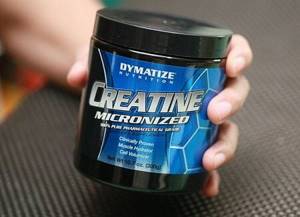
- Gastrointestinal tract. Taking creatine can also lead to a number of side effects in the gastrointestinal tract - pain, nausea, diarrhea. As a rule, these phenomena occur during the loading phase, when the maximum doses of the substance enter the body. Problems with the gastrointestinal tract may occur due to low quality creatine (for example, insufficient purification). To avoid these phenomena, you can abandon the powder in favor of tablet or liquid form. There is a lot of talk about the supposedly incredible effects of new forms of creatine. But they are not as good as the creators prove. Stomach problems are also possible. The only exceptions are the “malate” and “citrate” forms. They are good because they dissolve well in water and do not linger in the stomach.
- Muscle spasms (cramps). Many articles have been written and several studies have been conducted on this subject. But there is no clear evidence. If seizures occur, they are extremely rare. And the cause is not creatine as such, but a severe lack of fluid in muscle cells. In addition, increased load during training often leads to the appearance of spasms.
Does creatine affect hair condition?
There are rumors that this supplement negatively affects the condition of the skin, nails and hair. Some men may not pay attention to the first and second and put up with brittle nails or dry skin. But not everyone will agree to have a billiard ball hairstyle.
Scientists have conducted some research on this issue, and it has been proven that taking creatine can increase hair loss. However, not to such an extent that you go bald completely in a month. Therefore, those who have thick hair need not worry. But those who are afraid of losing extra hair should know that creatine supplements increase hair loss.
The effect of creatine on potency

Many athletes taking creatine to increase endurance wonder: does creatine affect potency? Experts believe that a high-quality product does not have a negative effect on male reproductive abilities. Of course, the food additive must be of high quality and not of dubious origin.
To answer the question of how creatine affects potency, we can also add that when using a low-quality supplement, a negative effect on the male body and potency in particular is possible, but only due to the presence of various additional additives.
Thus, there is no point in worrying about whether creatine is harmful to potency if a man uses a high-quality supplement from a well-known company, and has also consulted with a doctor first.
Conclusions about the benefits of creatine
Taking into account the above, including the characteristics of creatine, we can draw the following conclusions about the benefits of this dietary supplement:
- Creatine increases physical endurance of muscles and promotes rapid muscle growth. Regular use of this dietary supplement creates additional energy reserves at the cellular and tissue level in the human body.

- Creatine promotes water retention in the body. During a period when muscle mass is rapidly growing, this is a very important indicator.
- Creatine has a neutralizing effect on certain acids produced during intense training. One of them is lactic acid. This allows you to train for a longer time and at a higher quality.
- Regular intake of creatine trains the body to withstand physical activity much longer without the required amount of oxygen and with high muscle tension. One of the important conditions for taking creatine is to use it at a time when muscle mass is “burning” and is in its most active state.
- Creatine also has a positive effect on heart function. In particular, the heart muscle. He is able to increase the power of her work. However, this property of this substance is more applicable in medicine than in sports.
Creatine is not a hormone, as many people believe, which is why they are afraid to take it. Most athletes are afraid of any changes in hormonal levels. Doctors say these fears are unfounded. Taking creatine is generally safe for health.
However, you should not abuse this substance, like many others, to avoid unwanted side effects.
Take care of yourself! Take care of your physical and mental health! Carefully monitor your diet and exercise regularly. Then your achievements in your sports life will be obvious, and your appearance will definitely please you.
Harm of creatine and side effects
Content
Does creatine have contraindications and side effects? Yes, they are inherent in all sports nutrition. Although, if we talk about a drug like creatine, side effects are minimal. Let’s say right away that there are no irreversible side effects from taking creatine. Other negative influences are transitory in nature, their frequency of occurrence is 3–4%.
The harmful effects of creatine on the body have been examined in numerous studies, which conclude that the product has a high level of safety. Moreover, it was found that the substance has a beneficial effect on the duration and quality of life in old age. During testing, an increased dosage of the substance was used (up to 25 g/day); the effect of creatine did not provoke negative results in the subjects.
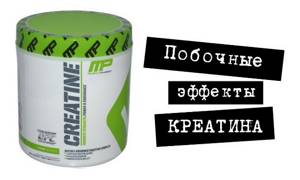
One of the most frequently raised questions is the side effects of creatine and what harm it can cause to an athlete’s health.
Possible side effects are listed on the packaging. Below are the side effects that the supplement causes. But it should be taken into account that unpleasant sensations may develop in the body not so much because of creatine itself, but because of the presence of impurities in the composition. Each manufacturer creates a special formula and includes a wide variety of substances in it: vasoactive amino acids, sugar, flavorings, etc. The article will discuss exclusively the negative effects of pure creatine monohydrate.
Water retention
The most common side effect comes down to the osmotic activity of the drug - creatine retains water in the body. This effect of creatine, confirmed in scientific research, cannot be completely attributed to harmful effects, since the reaction compensates for the osmotic balance. The condition occurs in all athletes who use creatine, but due to its low severity, the change is difficult to notice. The only simple way to determine your condition is to weigh yourself.
Despite the fact that creatine leads to fluid retention, it is impossible to limit water intake, because reducing the amount of fluid or taking diuretics leads to dehydration, which will cause significant harm to the body.
Dehydration
The effect of creatine is to direct blood to fuel muscles. Due to the redirection of water, the body experiences a lack of moisture and dehydration occurs - metabolic disorders appear, deviations in the acid-base balance, and the quality of heat regulation deteriorates. It is easy to avoid these manifestations. Drink more water, juices, compotes, etc. It is recommended to drink up to 3 liters of liquid per day.

The strongest justification is for side effects that are associated with the osmotic activity of creatine; simply put, creatine consumption is associated with an increase in water retention in the body
There are drying methods on the Internet that combine creatine intake with stimulants and diuretics. As a result, dehydration occurs, which is harmful to health and physical development, and the required effect is not achieved.
Interesting! People often ask what the effects of alcohol and creatine are when used together. In the process of large-scale research, it was discovered that alcohol forms a biochemical environment that inhibits the effect of the substance and the body’s reaction. Alcohol blocks protein synthesis in muscle tissue, causing insulin resistance, and also negatively affects the production of growth hormone.
Digestion
Indigestion is typical for the loading stage. The reason for the negative effect is the slow dissolution and absorption of creatine crystals; this is typical for a low-quality product that has not gone through all purification cycles.
In this case, the following were observed:
- diarrhea (diarrhea);
- pain in the abdominal area;
- nausea.
The range of modern sports nutrition no longer includes such low-quality products. Diarrhea from creatine remained in the 90s, and some dubious drugs were sold in the 2000s. Today, manufacturers give preference to micronized monohydrate; it completely dissolves in the stomach and is quickly absorbed.

The second most common side effect of creatine is gastrointestinal distress, which manifests itself as abdominal pain, nausea, flatulence and diarrhea.
Sometimes athletes complain that creatine makes them sick. The problem is not so much in the substance itself, but in the impurities. You may have developed an allergic reaction to a specific sports drink.
Spasms and cramps
It is often said that the substance can cause spasms and convulsions. Practical tests and scientific studies have not established a relationship between creatine and these conditions.
Such phenomena are classified as restorative reactions at the resting stage, which is why an opinion has formed about the relationship between the development of strength and the increase in cramps and spasms.
The appearance of cramps and muscle spasms may be due to dehydration. The reason is a long time of training without water, metabolic disorders. To increase endurance, you can use creatine and coffee. Caffeine is consumed immediately before intense physical activity.
Skin problems
There are a lot of complaints online that acne appears from creatine, most often on the face. Acne is a skin disease that can indeed be a side effect of taking creatine, but the reaction is very rare. These cases refer to exceptional reactions of the body. The supposed cause of acne breakouts after taking sports nutrition is excess testosterone synthesis. On the other hand, an increase in testosterone concentration is also a result of an increase in mass.

This is a very rare side effect, but sometimes it occurs
Side effects of creatine on the liver
Sometimes, even from authoritative sources, statements appear regarding the negative effect of creatine on the liver. They can be considered unsubstantiated, since there is a lot of objective research that does not support the claims. Tests reliably show the risk of the destructive effects of creatine on the liver.
Normally, and even at high dosages, creatine does not cause negative effects on the liver. Tests were carried out even with taking 30 g at a time, the liver remained completely healthy. This is understandable even when considering the issue logically, since creatine is a natural component secreted by the body and does not lead to pathological processes. Metabolism of the drug does not occur in the liver, therefore, the liver is not affected by creatine.
Side effects of creatine on the kidneys
Creatine has little effect on the kidneys, but increases the number of metabolites by 80–90 times. This leads to an increased risk of kidney stones. Conducted studies show the development of cysts in experimental mice with polycystic kidney disease. When examining animals without pathologies, no renal disorders were found.
Independent researchers have analyzed how creatine affects the kidneys. The kidneys were not affected by the substance either within 24 hours after administration or after a long period of time.
The conclusion is obvious, a contraindication to creatine is polycystic kidney disease. For a healthy person, taking the substance does not pose a threat. The full effect of creatine on the kidneys has not been studied, but it is better to avoid consuming this sports nutrition if you have pathologies of the organ.
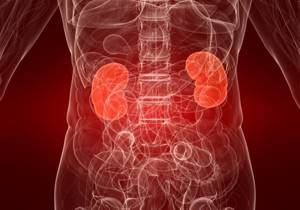
Numerous studies have clearly established that even large doses of creatine do not have a negative effect on the functioning and condition of these organs in healthy people.
Allergic reactions
Allergies are rarely related to the substance itself, but rather relate to the pathologies of the athlete. People with asthmatic bronchitis are at risk of itching, shortness of breath, skin rashes and peeling. Healthy people extremely rarely encounter such complications.
The downside of creatine is the risk of developing an allergic reaction to other sports nutrition. A similar condition appears when taking creatine in parallel with other supplements.
If allergic manifestations appear, it is important not to ignore the problem, but to address it:
- Make an appointment with an allergist. It is required to undergo diagnostic testing to determine the allergen.
- Analyze the composition of the additive. If it indicates a component to which you are hypersensitive, it is better to buy another sports nutrition.
There is an opinion that allergies can be suppressed with special medications and one can continue bodybuilding according to the usual method. In fact, the drugs mask symptoms or suppress immune function, both conditions are dangerous for humans.
Abuse
Harm from creatine can indeed occur, but it is not as bad as they say. Even without knowing how to use creatine, an athlete rarely experiences aggravation of the condition. Until now, high amounts of creatine have not led to an overdose, since the body eliminates the excess dosage on its own. The kidneys eliminate the excess through urine.



